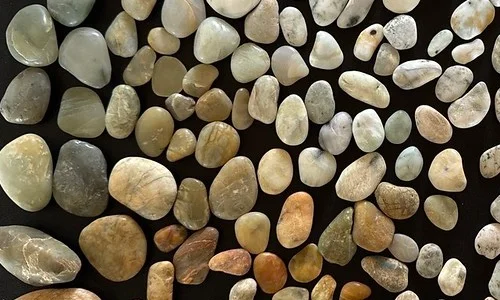This load of hydrogrossulars put into one of my 4lb tumbler barrels were all found on Monday, June 3rd – King’s birthday long weekend. I have never found this many different varieties of hydrogrossular garnets here before but the number of hydrogrossulars I’ve been finding has steadily increased over the last few months.
My good friend and fellow fossicker JP explains why hydrogrossular garnets are found in Orepuki (home of Gemstone Beach) in this post here. I also explain a little bit about hydrogrossulars in this post too.
In the book “A Photographic Guide to Rocks and Minerals of New Zealand“, authors Mortimer, Campbell & Low state that hydrogrossular garnets are considered semi-precious and significant as they were used as a hammerstone by Māori especially for shaping pounamu (nephrite). This has been a valuable resource for my rock tumbling hobby so I’d highly recommend the purchase of it if you don’t have it on your shelf!
Hydrogrossulars range from translucent to opaque. The most common colour I find on Gemstone Beach is white (often with black flecks which is most likely diopside) and a light tan colour. The colours I like finding the most is a bluish green, light green or green. More recently I’ve been finding examples of a darker translucent or opaque black. I’ve also picked up some pink and some white/yellow examples. It is interesting to note that hydrogrossulars differ from the other garnets in that they are never transparent.
Another tell-tale sign for hydrogrossulars is their smooth, waxy like texture. Although not all found are super smooth. Sometimes argillite can be mistaken for hydrogrossulars due to their smoothness but upon closer inspection you can really feel and see that waxy-ness that is particular to hydrogrossulars.
Hydrogrossular Garnet Research
When further researching hydrogrossular garnets I found this site: https://www.gemrockauctions.com/learn/a-z-of-gemstones/hydrogrossular-garnet. It had some interesting points that I did not know/realise but it further confirmed to me that identifying the stones I am tumbling is quite a difficult task!
- Hydrogrossular garnet is a commonly green, pink, or white semi-precious gemstone usually classified in the grossular garnet species.
- Sometimes, hydrogrossular garnet is called “hydrogarnet”. New Zealand specimens may be called “rodingite.”
- A mineral more similar to hydrogrossular garnet is idocrase (vesuvianite) which is another common jadeite simulant. Many stones contain both hydrogrossular garnet and idocrase.
- Was first officially identified and named in 1943 by Colin Osborne Hutton, New Zealand-born mineralogy professor at Stanford University. (JP’s blog post mentions this, so this I did know!)
Hydrogrossular Garnet Properties
There are a lot of “technical terms” used in the list below, many of which I don’t yet fully understand but I thought I’d include them anyway!
- Mohs hardness: 6.5-7.5
- Color: Green, blue-green, pink, white, gray, brown; Sometimes rose-red or yellow; Can be multi-colored
- Crystal structure: Isometric (cubic)
- Luster: Waxy, vitreous, or sub-adamantine
- Transparency: Translucent to opaque
- Refractive index: 1.67-1.814; Usually 1.72
- Density: 3.13-4.20
- Cleavage: None
- Fracture: Conchoidal or splintery
- Streak: White
- Luminescence: Usually none; Sometimes fluorescence – pink or pinkish-orange in green or pink specimens
- Pleochroism: None
- Birefringence: None
- Dispersion: None
Batch 65: 4lb Tumbler 2
There are three particular stones in Batch 65 that, although they have that waxy smooth appearance, their colour makes me doubt that they are indeed hydrogrossular garnets. However I’m still including them in this batch with all the others but I will be asking JP what he thinks next time he’s down here rockhunting.
Stage 1: 80/100grit
Skipped due to the smoothness of hydrogrossulars pre-tumble
Stage 2: 220grit
Number of Stones: 148
Weight in: 1455 grams
4 Tbspns of 220grit
1½ Tbspns Borax
Small stones added for cushioning/filler
Days Tumbling: 10
Weight out: 1271g – loss of 184g
Stage 3: 400grit
Number of Stones: Not sure
Weight in: 1011g
3 Tbspns of 400grit
1 Tbspn Borax
Ceramic media added for cushioning
Days Tumbling: 7
Weight out: 912g – loss of 99g
Batch 65: Pre-tumble
Batch 65: Not sure?
Pre-polish Soap Tumble: 24 hours
Note to self: The small stones were actually a pain to be honest because of sorting. Often the stones that you are tumbling become quite small especially if they are softer stones. It was really hard to sort out the small stones from the stones that were part of the batch. I really do like using ceramic media rather than plastic pellets as they are much easier to separate from the stones AND they don’t have to be stage-specific – just give them a good rinse and they can follow the stones in any stage!
3lbT4: Ready to Polish
After inspecting this load and sorting out redos there weren’t enough stones to continue with a full 4lb barrel load. This batch (65) was placed in the Gemstone Beach readies basket to wait patiently for a 3lb barrel to come free! That happened on July 1st and the hydrogrossulars were transferred to 3lbT4 to complete their polish tumble.
Stage 4: Polish Mix
Number of Stones: 123
Weight in: 911g
Polish Mix (1st use): 4 Tbspns of polish mixed with 300mls of clean water. Plastic Pellets added.
Days Tumbling: 10
Didn’t Weigh! I got so carried away with their shine and beauty that I forgot to weigh this batch.
I was super happy with the shine and finish of this batch. There are some stunning hydrogrossulars in this lot!
Polish Complete for Batch 65
Polished Stones of Interest: Batch 65 – Hydrogrossulars
Batch 65 | 4lb Tumbler 2 | Gemstone Beach | 7 June – 25 June 2024
3lb Tumbler 4 | 1 July – 10 July 2024












One Reply to “Batch 65: A Load of Hydrogrossulars”